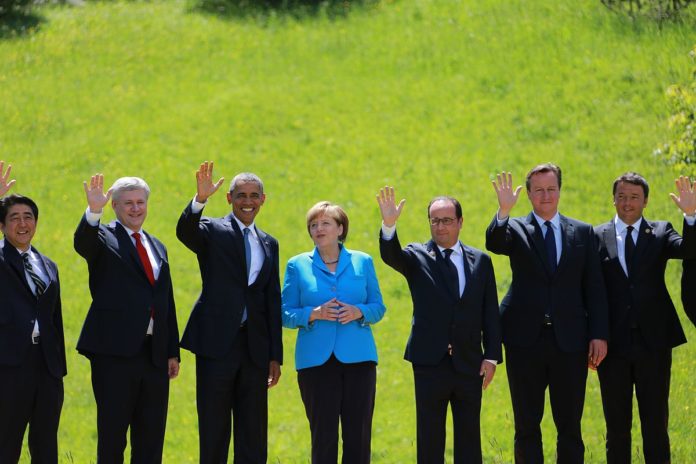
(UR) Worldwide — G7 leaders just signed a joint declaration to finally ditch fossil fuels for good. By pledging to end fossil fuel subsidies by 2025, leaders of the U.K., U.S., Canada, France, Germany, Italy, Japan, and the E.U. seem to finally take the hint that the world will no longer tolerate dirty energy.
Though the G7 and the World Trade Organization have been known to undermine the creation of homegrown solar, wind, geothermal, and other cleaner energy forms in many nations, the sheer force of momentum propelling our world toward energies which don’t rape and pillage the planet is palpable.
The declaration covers many urgent topics, but regarding energy, the G7 state:
“Recognizing the important role that the energy system has to play in the implementation of the Paris Agreement, we are determined to accelerate our work towards the transition to an energy system that enables a decarbonization of the global economy, and commit to further invest in supporting innovation in energy technologies and encouraging clean energy and energy efficiency, so as to ensure economic growth with reduced GHG emissions. Faced with the increased uncertainty posed by the current energy price levels, we also commit to play a leading role in facilitating energy investments, in particular investments in quality energy infrastructure and upstream development.”
Notice there is no apology for the degradation of our oceans, lakes, rivers, agricultural land, or the ruining of local economies by coal, oil, gas, and nuclear power companies. There is, though, an acknowledgement that fossil fuels are having a difficult time remaining viable while solar and wind power costs keep declining.
Take, for example, the company SolarCity, which seems poised to continue an aggressive trend of improvement in solar power. The company is building an enormous $750 million factory in Buffalo, New York, that will produce 10,000 solar panels per day, or one gigawatt of power generation capacity per year. This one plant could propel the U.S. into a solar power leader.
CleanTechnica has explained that solar power costs will fall another 40 percent by 2017. Unless it’s to wage another energy war, when has oil or gas ever been so affordable? Record low solar energy prices around the world are causing a dramatic shift that would have left G7 countries in the cold without an appropriate move away from fossil fuels.
This doesn’t even account for the lowered prices that Chinese solar companies have already been able to provide their customers, with parity with the current fossil fuel grid already being surpassed at 50 cents per watt (they can do solar for 36 cents per watt in China).
Nor does the G7 account for the advances we can expect in solar and wind technologies. Major accomplishments in photonics and wind generation are already happening. The same is true for power generated from ocean waves and other sustainable, clean sources.
Furthermore, Portugal just ran their entire city on completely sustainable energy for more than 107 hours, and Burlington, Vermont recently became the first U.S. city to run completely on renewables. Iceland currently generates almost 100 percent of its electricity with renewables: 75 percent of that from large hydro and 25 percent from geothermal.
Do we really need to keep paying oil and gas companies to plunder the planet? It seems even the power players, pun intended, are finally getting the message.
What are your thoughts? Please comment below and share this news!
This article (G7 Leaders Sign Declaration To End ALL Fossil Fuel Subsidies By 2025) is free and open source. You have permission to republish this article under a Creative Commons license with attribution to the author and UndergroundReporter.org.




